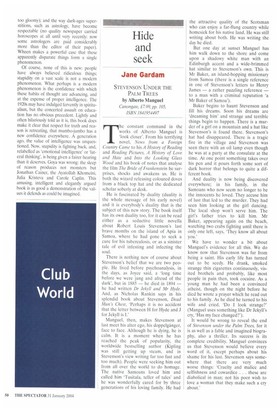Hide and seek
Jane Gardam
STEVENSON UNDER THE PALM TREES by Alberto Manguel Canongate, £7.99, pp. 105, ISBN 1841954497 The constant command in the works of Alberto Manguel is 'look closer'. From his terrifying novel, News from a Foreign Country Came to his A History of Reading and Reading Pictures, A History of Love and Hate and Into the Looking Glass Wood and his book of notes that analyse the film The Bride of Frankenstein he surprises, shocks and awakens us. He is both the wizard releasing coloured doves from a black top hat and the dedicated scholar soberly at desk.
He is fascinated by duality (duality is the whole message of his early novel) and it is everybody's duality that is the subject of this new story. The book itself has its own duality too, for it can be read either as a seductive little novella about Robert Louis Stevenson's last brave months on the island of Apia in Samoa, where he had gone to seek a cure for his tuberculosis, or as a sinister tale of evil infesting and infecting the soul.
There is nothing new of course about Stevenson's belief that we are two people. He lived before psychoanalysis, in the days, as Joyce said, a 'long time before we were jung and afreud of the dark', but in 1885 — he died in 1894 — he had written Dr Jekyll and Mr Hyde. And, as Nicholas Rankin says in his splendid book about Stevenson, Dead Man's Chest, 'Perhaps it is no accident that the letter between H for Hyde and J for Jekyll is I,'
Manguel, then, makes Stevenson at last meet his alter ego, his doppelganger, face to face. Although he is dying, he is calm. It is a moment when he has reached the peak of popularity, the worldwide bestselling author (Kipling was still getting up steam, and in Stevenson's view writing far too fast and too much). People were seeking him out from all over the world to do homage. The native Samoans loved him and called him `Tusitala, teller of tales' and he was wonderfully cared for by three generations of his loving family. He had the attractive quality of the Scotsman who can enjoy a far-flung country while homesick for his native land. He was still writing about both. He was writing the day he died.
But one day at sunset Manguel has him walk down to the shore and come upon a shadowy white man with an Edinburgh accent and a wide-brimmed hat similar to Stevenson's own. This is Mr Baker, an island-hopping missionary from Samoa (there is a single reference in one of Stevenson's letters to Henry James — a rather puzzling reference — to a man with a criminal reputation 'a Mr Baker of Samoa).
Baker begins to haunt Stevenson and fill his dreams. Soon his dreams are 'dreaming him' and strange and terrible things begin to happen. There is a murder of a girl on a mountain and a hat like Stevenson's is found there. Stevenson's hat had disappeared. There is a tragic fire in the village and Stevenson was seen there with an oil lamp even though he was at a party at the consulate at the time. At one point something takes over his pen and it pours forth some sort of dark horror that belongs to quite a different book.
And duality is now being discovered everywhere; in his family, in the Samoans who now seem no longer to be the innocents he loved. They accuse him of lust that led to the murder. They had seen him looking at the girl dancing. The local shop won't serve him. The girl's father tries to kill him. Mr Baker, appearing again on the beach, watching two crabs fighting until there is only one left, says, 'They know all about you.'
We have to wonder a bit about Manguel's evidence for all this. We do know now that Stevenson was far from being a saint. His early life has turned out to be seedy. He drank, smoked strange thin cigarettes continuously, visited brothels and probably, like most people in pain then, took cocaine. As a young man he had been a convinced atheist, though on the night before he died he wrote a prayer which he read out to his family. As he died he turned to his wife and cried, 'Do I look strange?' (Manguel uses something like Dr Jekyll's cry, 'Has my face changed?').
It would be wrong to reveal the end of Stevenson under the Palm Trees, for it is as well as a fable and imagined biography, also a thriller. Its success is its complete credibility. Manguel convinces us that Stevenson would believe every word of it, except perhaps about his shame for his lust. Stevenson says somewhere that there are very much worse things: 'Cruelty and malice and selfishness and cowardice . . . these are diabolical in man; not his poor wish to love a woman that they make such a cry about.'




























































































 Previous page
Previous page